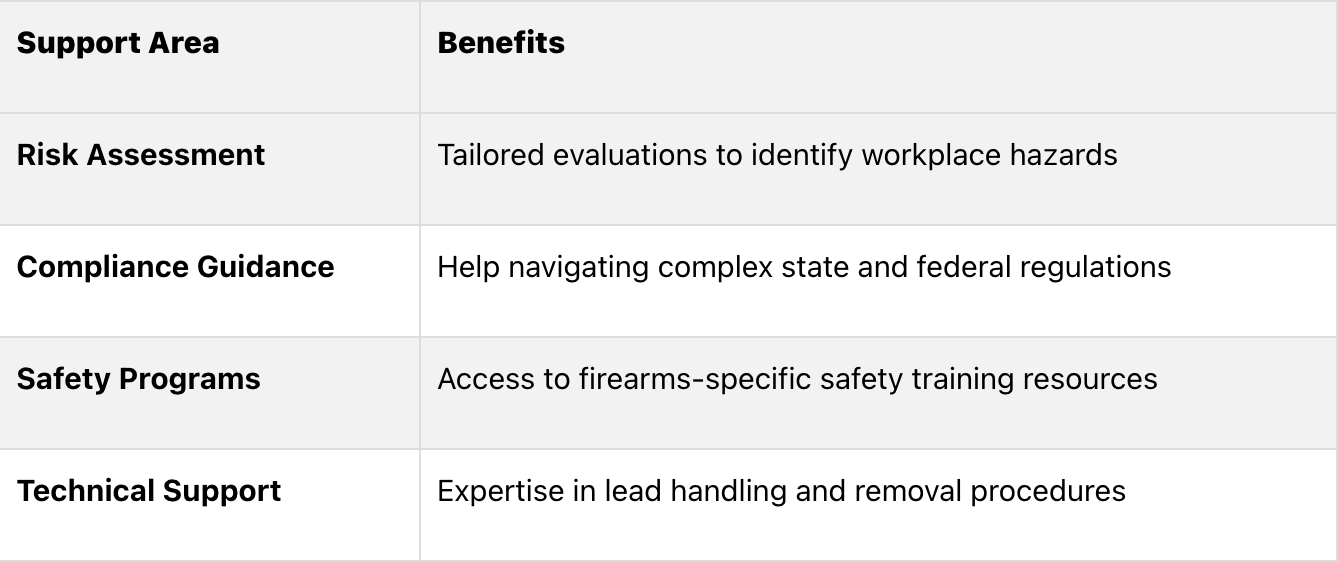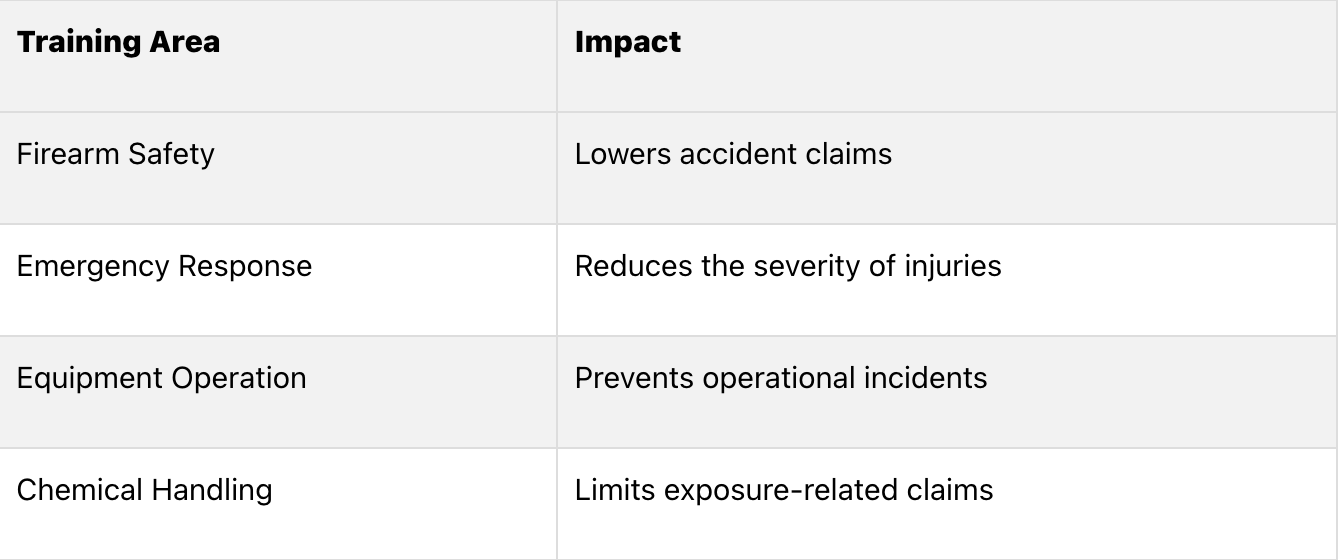
Workers' compensation insurance is essential for firearms businesses to protect employees and comply with legal requirements. This type of coverage addresses unique risks like accidental discharges, lead exposure, repetitive strain injuries, and hearing damage from gunfire. Here’s a quick guide to getting started:
Selecting a knowledgeable insurance provider with expertise in the firearms industry can help you manage risks effectively while lowering costs.
Workplace hazards in firearms businesses highlight the importance of having well-structured workers' compensation coverage.
Accidents involving firearms are a major concern in gun shops, shooting ranges, and manufacturing facilities. Issues like accidental discharges or improper handling can put employees in danger. To minimize these risks, consider implementing the following safety measures:
"Educate yourself and know the risks - it's not just bullets you need to watch out for." - James Maddox, former gun-range manager in Kentucky [4]
Lead exposure is a significant hazard in firearms facilities, especially in indoor shooting ranges. According to inspections, 86% of commercial gun ranges were found to have violated lead-related standards [4].
"Lead exposure at gun ranges is a serious problem and we think it could be quite widespread." - Dr. Elana Page, medical officer for NIOSH [4]
Workplace injuries can add up quickly, with costs averaging $1.36 per hour, or 4.1% of total compensation [3]. To reduce the risk of ergonomic and physical injuries, consider these steps:
The need for safety measures is underscored by the fact that 4,836 workers lost their lives on the job in 2015 alone [3]. These numbers emphasize the importance of creating a safer work environment and ensuring comprehensive insurance protection.
"Management must be fully engaged in creating, planning, implementing, and communicating safety programs." [3]
These workplace risks make it clear why tailored insurance coverage is essential, which we’ll explore in the next section.
Choosing workers' compensation coverage tailored to the unique challenges of the firearms industry is essential for addressing specific risks and meeting legal obligations.
Workers' compensation policies typically provide medical benefits, wage replacement, and disability support [6]. For firearms businesses, certain coverage elements are particularly relevant:
Navigating the legal landscape can be tricky for firearms businesses, as both state and federal regulations come into play. Over half of U.S. states have laws that directly impact workplace practices in the firearms industry [7].

In addition to standard workers' compensation, firearms businesses should consider extra coverage to protect against broader operational risks:
It's worth noting that traffic accidents are the leading cause of workers' compensation death claims when employees are on the road for work [2]. Workers' compensation also extends to injuries or illnesses that occur within the "course and scope" of employment, including exposure to toxic chemicals [2].
When it comes to securing workers' compensation coverage for the firearms industry, choosing a provider with expertise in this niche is essential. This ensures the coverage addresses specific risks and complies with legal requirements [8]. Here's what to consider when evaluating an insurance provider capable of managing firearms-related claims.
An effective provider should excel in managing claims unique to the firearms industry. Key qualities include:
A provider with in-depth knowledge of the firearms sector can offer valuable support in several areas:

A provider’s track record speaks volumes about their ability to serve the firearms industry effectively. Look for evidence such as:
"We wanted to thank you for all the hard work you have put in regarding our insurance policies. We really appreciate all of the savings and your excellent customer service. It is a pleasure to work with you and your company." - CMMG [2]
For example, CZ-USA, Inc. achieved nearly a 30% reduction in premiums through strategic coverage audits and contract negotiations [2]. This underscores the value of working with a provider that combines expertise with a proactive approach to cost management.
Managing workers' compensation costs in firearms businesses requires a focused approach to safety and risk management. On average, employer costs for worker injuries amount to $1.36 per hour worked, which represents 4.1% of total compensation [3].
A well-designed safety program can help lower insurance premiums by addressing workplace hazards and improving overall safety.
Workplace Safety Measures
Implementing specific safety measures tailored to firearms businesses can significantly reduce risks. Examples include:
These actions directly tackle the unique challenges associated with firearms environments.
The Role of Training
Training employees in key areas not only enhances workplace safety but also reduces insurance claims. Here's how:

Maintaining thorough documentation is critical for controlling insurance costs. Experience modification rates (Mods) are a key factor in premium calculations, with rates below 1.0 leading to lower premiums [11].
Essential records to maintain include:
These records not only support cost reduction strategies but also demonstrate a commitment to workplace safety.
Data from Wisconsin highlights that targeted cost reduction strategies can decrease premiums by 14.17%.
Leveraging Technology
Taking Advantage of Premium Credit Programs
Regular policy audits can uncover classification errors and identify potential credits, further reducing premiums [12]. When combined with documented safety efforts, these strategies show a clear commitment to risk management and can lead to meaningful savings.
Tailored coverage, specialized expertise, and effective risk management are the cornerstones of reliable workers' comp insurance for firearms businesses [16]. Modern claims systems can streamline processes, cutting claim times by 30% and reducing costs [16].
Coverage and Compliance
Select workers' comp insurance that addresses both immediate and long-term risks specific to the firearms industry [14]. This approach not only safeguards your business but also helps you avoid costly regulatory penalties [1]. Additionally, working with a provider that understands the unique challenges of the industry is essential.
Why Industry Expertise Counts
The firearms industry demands specialized support, with 87% of policyholders emphasizing the importance of expert claims handling [15].
"A first class Insurance Broker representing the insured not the insurance company. They are the very best in the business!"
– Fritz S. [1][5]
Risk Management and Cost Savings
Beyond coverage and expertise, managing risks effectively is key to controlling costs. Consider these factors:

Firearms businesses can cut down on workers' compensation insurance costs by prioritizing safety, staying compliant, and managing risks effectively. A good starting point is to introduce thorough safety training programs. Teaching employees how to handle firearms correctly and avoid workplace hazards can lead to fewer accidents - and fewer claims mean lower insurance premiums.
Another key step is ensuring your workplace complies with OSHA regulations. A safe and compliant environment not only reduces risks but also shows insurers that you care about employee safety, which can work in your favor. On top of that, consider boosting security measures, like adding surveillance systems and secure firearm storage, to further minimize potential risks and possibly lower costs.
Lastly, take the time to review your insurance policy regularly. Make sure you're not paying for coverage you don’t need. By customizing your policy to fit your business, you can find the right balance between saving money and maintaining proper protection.
Regulatory Compliance and Workers' Compensation Insurance for Firearms Businesses
Navigating regulatory compliance is a key factor when choosing workers' compensation insurance for firearms businesses. This industry operates under stringent state and federal laws governing the handling, storage, and sale of firearms. Because of this, insurance providers often require proof that your business meets these regulations. Falling short can lead to steep fines, legal troubles, or even the loss of your business license.
Beyond compliance, workers' compensation policies for firearms businesses must address specific risks unique to the industry. These can include injuries related to handling firearms or incidents tied to security measures. Staying compliant not only helps you secure the right coverage but also shields your business from liabilities while preparing you to handle the particular challenges of the firearms industry.
When choosing workers' compensation insurance for your firearms business, there are a few important factors to keep in mind. First, seek out providers with expertise in the firearms industry. They’ll have a better grasp of the specific risks and regulations your business deals with daily. It’s also essential that they provide customized coverage options designed to address firearm-related workplace injuries and other unique hazards.
You’ll also want to evaluate the provider’s track record and reputation in working with firearms businesses. Their financial stability and ability to process claims efficiently are equally important. Finally, a provider that offers risk management advice tailored to your operations can be a valuable asset, helping you stay compliant while keeping your employees safe. Weighing these factors carefully will guide you to the right insurance provider for your business.
If you're looking for reliable gun business workers comp solutions that actually fit your operation, now’s the time to take the next step. Don’t wait until there’s a problem—get ahead of it with the right coverage and support. We’re here to help firearm businesses across New Jersey stay protected, stay legal, and keep things running smoothly. Reach out today to see how we can help you get set for 2025.
Call Now: 800-526-2199. Or submit your inquiry below. We look forward to having the opportunity to work with you!